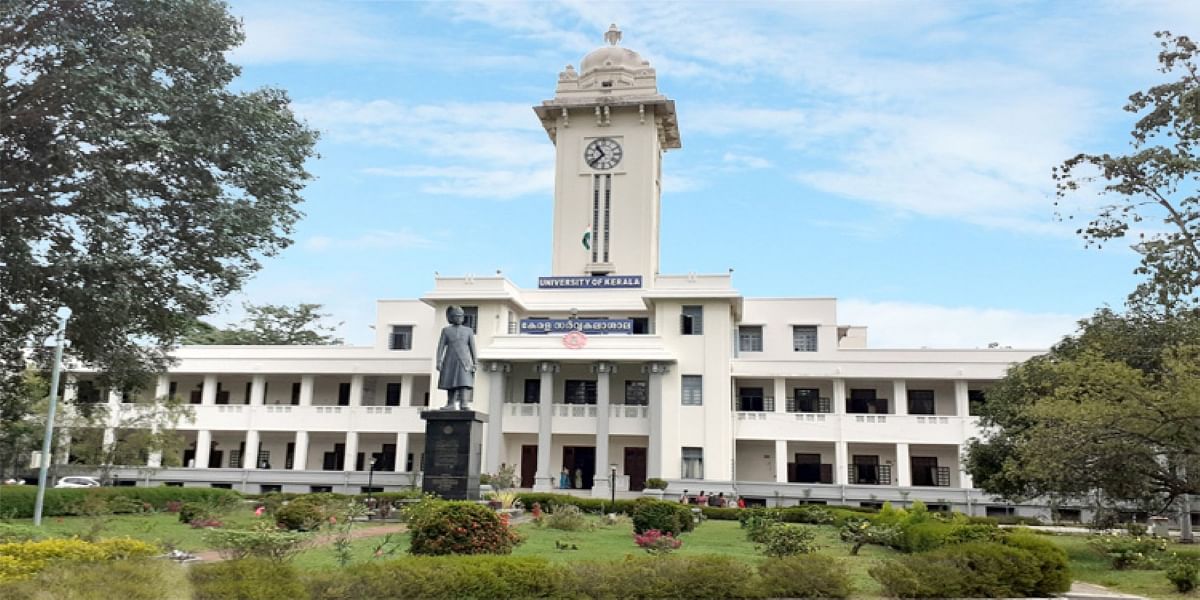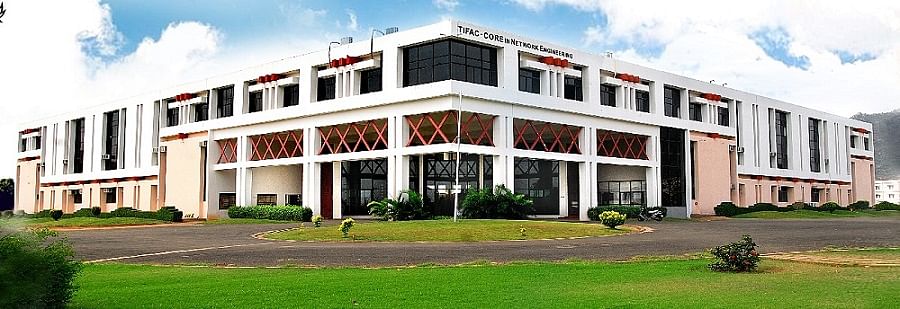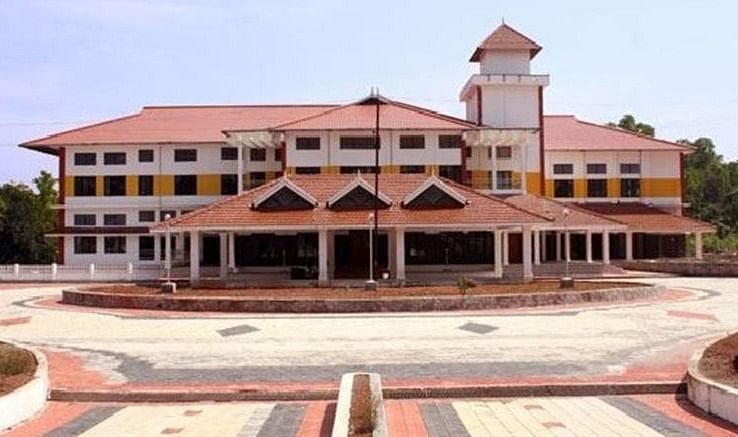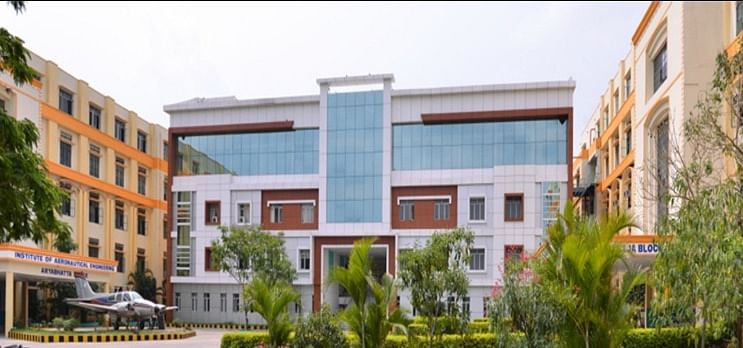B.Tech Aeronautical Engineering: Course Details, Eligibility, Fees, Admission

B.Tech Aeronautical Engineering is a 4-year undergraduate course that provides a thorough understanding of the design, construction, and maintenance of various aircraft and their components. BTech Aeronautical Engineering core subjects include topics like Aerodynamics, Aircraft Materials and Production, Aircraft Propulsion, Aircraft Design, Vibration and Aero-elasticity, etc.
The B.Tech Aeronautical Engineering admission process requires students to have a minimum of 55-60% aggregate marks in the 10+2 examination with a science stream. The candidate must also have a valid score in any one of the entrance exams such as JEE Main, JEE Advanced, MET, etc., depending on the college requirement.
The BTech Aeronautical Engineering fees are in the range of INR 80,000 - 5,75,000 per year based on the college chosen for admission. The fees range in government colleges is around INR 80,000 - 2,20,000 per year whereas the BTech Aeronautical Engineering fees in private colleges range from INR 1,00,000 - 5,75,000 per year in India.
Table of Contents
- What is a B.Tech Aeronautical Engineering Course?
- BTech Aeronautical Engineering Eligibility Criteria
- Why Choose a B.Tech in Aeronautical Engineering Course?
- BTech in Aeronautical Engineering Admission Process 2024
- BTech in Aeronautical Engineering Entrance Examination
- Top B.Tech Aeronautical Engineering Colleges in India with Fee Details
- Types of BTech Aeronautical Engineering Courses
- B.Tech Aeronautical Engineering Syllabus and Subjects
- B.Tech Aeronautical Engineering vs B.Tech Aerospace Engineering
- Courses After BTech Aeronautical Engineering
- Career Options After BTech in Aeronautical Engineering Course
- BTech Aeronautical Engineering Salary in India
- Top 3 Cities to Pursue BTech Aeronautical Engineering Course
- BTech Aeronautical Engineering Scholarships
- Skills to Excel as a BTech in Aeronautical Engineering Graduate
B.Tech Aeronautical Engineering Course Details
| Degree | Bachelors |
| Full Form | Bachelor of Technology in Aeronautical Engineering |
| Duration | 4 Years |
| Age | No age limit |
| Minimum Percentage | 50% marks for general category and 45% for SC/ST/PwD categories in 10+2 examinations. |
| Average Fees | INR 80,000 - 5,75,000 per year |
| Average Salary | INR 5-15 LPA [Source: AmbitionBox] |
| Employment Roles | Avionics Engineer, Aviation Systems Engineer, Wing Commander, Pilot, etc |
| Top Recruiters | Indigo, Air India, ISRO, Hindustan Aeronautics Limited (HAL), etc. |
What is a B.Tech Aeronautical Engineering Course?
B.Tech Aeronautical Engineering full form is Bachelor of Technology in Aeronautical Engineering. The course involves foundations in mathematics and engineering physics and incorporates techniques from aerodynamics, probability and statistics, and aircraft design. The students can also specialize in areas like computational engineering, autonomous drone technology, aerospace & defense, etc. The course falls under the umbrella of B.Tech courses.
The job scope of BTech Aeronautical Engineering is vast, as it offers various job roles ranging from Aircraft Design Engineer to Aircraft Maintenance Technician, in various sectors like civil aviation, automotive, aerospace, defense, design, etc. The average salary for BTech Aeronautical Engineering graduates is around INR 5-15 LPA. [Source: AmbitionBox]
BTech Aeronautical Engineering Eligibility Criteria
The aspirants who are planning to do a B.Tech Aeronautical Engineering course should meet the institution's eligibility requirements for admission. Some of the B.Tech Aeronautical Engineering eligibility criteria are listed below:
- The candidate should have passed 10+2 examinations from the science stream with a minimum of 55-60% marks for the general category and 5% relaxation is given to reserved category students. The student is also required to clear BTech Aeronautical Engineering entrance exams like JEE Mains, JEE Advanced, MET, etc.
- There is no age limit.
Why Choose a B.Tech in Aeronautical Engineering Course?
BTech Aeronautical Engineering course is diverse, as it helps students to build their careers in different areas like aircraft design, development, and maintenance, etc. Below listed are a few reasons why one should choose B.Tech Aeronautical Engineering course:
- As per the BLS report, the employment of aeronautical engineers is expected to increase by 6% from 2022 to 2032.
- As per a Bureau of Labor Statistics report, engineering career opportunities are expected to grow 7% nationwide by 2026.
- According to the US Bureau of Labour Statistics, about 3,800 openings for aeronautical engineers are projected each year, on average, over the decade.
Read More: B.Tech Aeronautical Engineering Jobs and Scope
BTech in Aeronautical Engineering Admission Process 2024
The B.Tech Aeronautical Engineering admission is based on the evaluation of merit and the entrance exam score of the candidate. Below listed is the BTech Aeronautical Engineering general admission process:
- Step 1: The student must clear the entrance exam cut-off as per the university requirement.
- Step 2: The candidate must fill out the college application form available online or offline.
- Step 3: As per the college requirement, the student may also be required to clear GD or personal interview rounds.
- Step 4: Once the final merit list is published, the student must pay the admission fees and complete the document verification process.
Read More: B.Tech Admission
BTech in Aeronautical Engineering Entrance Examination
B.Tech Aeronautical Engineering Entrance exams are conducted at national, state, and institute levels such as JEE Main, JEE Advanced, MET, etc. The B.Tech entrance exams are conducted for admission purposes, and students must have valid entrance test scores.
Some of the top B.Tech Aeronautical Engineering entrance exams for aeronautical engineering in India are as follows:
|
Entrance Exams |
Examination Dates |
Accepting Colleges |
|
Jan 24-Apr 15, 2024 |
IIT Kharagpur, Indian Institute of Space Science and Technology, etc. |
|
|
May 26, 2024 |
IIT Madras, IIT Bombay, IIT Kanpur, etc. |
|
|
Apr 19- Apr 30, 2024 |
VIT University |
|
|
May 2024 (Tentative) |
Manipal Institute of Technology |
|
|
April- June 2024 (Tentative) |
SRM University |
|
|
Jan 20- Feb 5, 2024 |
Lovely Professional University |
Top B.Tech Aeronautical Engineering Colleges in India with Fee Details
The top private BTech Aeronautical Engineering colleges in India include Amity University Noida, Manipal Institute of Technology, Hindustan Institute of Technology and Science, etc. The best government colleges offering B.Tech Aeronautical Engineering courses include IIT Madras, IIT Bombay, IIT Kanpur, etc.
Below listed are the top colleges in India offering BTech Aeronautical Engineering courses along with the fee breakdown:
|
NIRF Ranking 2023 |
Name of the College |
Tuition Fees Per Year |
Admission Fees |
Miscellaneous Fees Per Year |
|
1 |
INR 2,20,000 |
- |
INR 27,615 |
|
|
3 |
INR 1,19,000 |
- |
INR 34,500 |
|
|
4 |
INR 1,19,000 |
- |
INR 34,500 |
|
|
6 |
INR 2,00,000 |
INR 5,700 |
INR 57,710 |
|
|
31 |
INR 5,75,000 |
INR 20,000 |
INR 1,00,000 - 2,00,000 |
|
|
48 |
Indian Institute of Space Science and Technology, Trivandrum |
INR 1,25,000 |
INR 9,000 |
INR 29,200 |
|
50 |
INR 2,80,000 |
- |
INR 9,000 |
|
|
61 |
INR 2,03,000 |
INR 10,000 |
INR 1,22,000 |
|
|
- |
INR 2,00,000 |
- |
INR 5,200 |
|
|
- |
INR 1,75,000 |
INR 28,000 |
INR 26,000 |
|
|
- |
INR 1,01,000 |
- |
- |
Top City-Wise B.Tech Aeronautical Engineering Colleges in India
Below listed are location-wise B.Tech Aeronautical Engineering colleges in India with the annual fees:
|
Location |
Annual Fees |
|
INR 1,00,000 - 3,00,000 |
|
|
INR 1,00,000 - 2,25,000 |
|
|
INR 1,00,000 - 2,50,000 |
|
|
INR 90,000 - 3,00,000 |
|
|
INR 80,000 - 2,50,000 |
|
|
INR 80,000 - 2,00,000 |
|
|
INR 1,00,000 - 2,50,000 |
Types of BTech Aeronautical Engineering Courses
B.Tech Aeronautical Engineering courses can be pursued full-time and through integrated education mode. Below listed are B.Tech Aeronautical Engineering course details:
|
Course Type |
Eligibility Criteria |
Duration |
|
Full-Time B.Tech Aeronautical Engineering |
10+2 with a minimum of 55-60% marks for the general category and 5% relaxation for the reserved category + Entrance Exam Score + GD/PI performance |
4 Years |
|
Integrated B.Tech Aeronautical Engineering |
10+2 with a minimum of 50-55% marks for the general category and 45% marks for the reserved category + Entrance Exam Score |
5 Years |
Integrated B Tech Aeronautical Engineering Course
Students can pursue BTech + MTech Aeronautical Engineering as an integrated course after completion of 12th grade. Below listed are a few details about the BTech Aeronautical Engineering integrated course:
- The Integrated Aeronautical Engineering course duration is usually 5 years.
- The course can be pursued at colleges like the School of Aeronautics (Neemrana), Amity University Noida, IIEST Shibpur, etc.
- The annual BTech Aeronautical Engineering fees are between INR 1,00,000 - 2,00,000 per year.
- Students can also pursue a B.Tech Aeronautical Engineering + MBA from the National Institute of Aeronautical Engineering Research and Management, New Delhi as an integrated course.
B.Tech Aeronautical Engineering Syllabus and Subjects
The B.Tech Aeronautical Engineering first-year syllabus focuses on subjects such as Engineering Physics, Engineering Graphics, Engineering Mechanics, etc. The second-year B.Tech Aeronautical Engineering syllabus deals with subjects such as Aerodynamics, Aircraft Materials and Production, Analysis of Aircraft Structures, etc.
The third-year B.Tech Aeronautical Engineering syllabus includes subjects like Aircraft Propulsion, Aircraft Systems and Controls, Aircraft Design, etc. whereas the fourth-year B.Tech Aeronautical Engineering syllabus includes Vibration and Aero-elasticity and professional elective subjects.
Listed below is the semester-wise B.Tech Aeronautical Engineering syllabus:
|
Semester I |
Semester II |
|
Mathematics - I |
Mathematics - II |
|
Engineering Physics |
Chemistry |
|
Programming for Problem Solving |
Engineering Mechanics |
|
Engineering Graphics |
Engineering Workshop |
|
Environmental Science |
English |
|
Semester III |
Semester IV |
|
Probability and Statistics & Complex Variables |
Probability Distributions and Numerical Methods |
|
Basic Electrical and Electronics Engineering |
Low-Speed Aerodynamics |
|
Theory of Structures |
Aircraft Materials and Production |
|
Fluid Mechanics and Hydraulics |
Analysis of Aircraft Structures |
|
Aerodynamics - I |
Aero-Thermodynamics |
|
Constitution of India |
|
Semester V |
Semester VI |
|
Aircraft Propulsion |
Space Propulsion |
|
High-Speed Aerodynamics |
Computational Aerodynamics |
|
Finite Element Methods |
Helicopter Aerodynamics |
|
Business Economics and Financial Analysis |
Professional Elective - I |
|
Aircraft Systems and Controls |
Open Elective - I |
|
Aircraft Performance and Stability |
Aircraft Design |
|
Computer-Aided Aircraft Engineering Drawing |
Environmental Science |
|
Intellectual Property Rights |
|
Semester VII |
Semester VIII |
|
Vibration and Aero-elasticity |
Professional Elective – V |
|
Professional Elective – II |
Professional Elective - VI |
|
Professional Elective – III |
Open Elective - III |
|
Professional Elective - IV |
Project Stage - II |
|
Open Elective - II |
|
|
Industrial-Oriented Mini Project/ Summer Internship |
|
|
Seminar |
|
|
Project Stage - I |
Read More: B.Tech Aeronautical Engineering Syllabus and Subjects
B.Tech Aeronautical Engineering vs B.Tech Aerospace Engineering
BTech Aeronautical Engineering focuses on the design of aircraft and offers job roles in the commercial aircraft industry, whereas BTech Aerospace Engineering deals with the design of both aircraft and spacecraft and can offer positions in the space industry.
Below listed is the difference between B.Tech Aeronautical Engineering and B.Tech Aerospace Engineering:
|
Course |
B.Tech Aeronautical Engineering |
B.Tech Aerospace Engineering |
|
Full Form |
Bachelor of Technology in Aeronautical Engineering |
Bachelor of Technology in Aerospace Engineering |
|
Course Overview |
The course curriculum covers topics like engineering mechanics, aerodynamics, aircraft design, vibration and aero-elasticity, etc. |
The course curriculum covers topics like gas dynamics, propulsion, heat transfer, aerospace structures, etc. |
|
Stream |
Engineering |
Engineering |
|
Course Duration |
4 Years |
4 years |
|
Eligibility |
55-60% in 10+2, with Physics, Chemistry, and Mathematics as compulsory subjects |
55-60% in 10+2, with Physics, Chemistry, and Mathematics as compulsory subjects |
|
Entrance Exam |
JEE Mains, JEE Advanced, MET, etc. |
JEE Mains, JEE Advanced, LPU NEST, etc. |
|
Top Colleges |
IIT Madras, Institute of Aeronautical Engineering Hyderabad, etc. |
LPU, SRM University, etc. |
|
Course Fees Per Year |
INR 80,000 - 5,75,000 per year |
INR 90,000 - 5,00,000 |
|
Average Salary |
INR 8-12 LPA |
INR 8-12 LPA |
|
Job Roles |
Aviation Systems Engineer, Wing Commander, Pilot, etc. |
Aerospace Designer, Aircraft Production Manager, Aerospace Engineer, etc. |
Courses After BTech Aeronautical Engineering
After completion of the B.Tech Aeronautical Engineering degree, students can pursue higher education or go for certification courses in related fields. Some of the higher education options are:
- M.Tech Aeronautical Engineering
- M.Tech Aerospace Engineering
- M.Phil Aeronautical Engineering
- Ph.D Aeronautical Engineering
- MBA
Career Options After BTech in Aeronautical Engineering Course
The scope of the BTech Aeronautical Engineering degree is diverse, as graduates can work in different fields like design engineering, aviation, avionics, etc. Below listed are a few jobs after the BTech Aeronautical Engineering course along with the hiring companies:
|
Job Designations |
Job Description |
Hiring Companies |
|
Avionics Engineer |
|
Indigo, Air India, Airbus, Air Asia, etc. |
|
Aviation Systems Engineer |
|
Honeywell Aerospace, Air Asia, Boeing, Airbus, etc. |
|
Wing Commander |
|
Indian Air Force, Hindustan Aeronautics Limited (HAL), DRDO, etc. |
|
Design Engineer |
|
Tata Advanced Systems, BAE Systems, Lockheed Martin, ISRO, etc. |
|
Flight Engineer |
|
Airport Authority of India, Indigo, Air India, Air Asia, etc. |
BTech Aeronautical Engineering Salary in India
B.Tech Aeronautical Engineering graduates with 0-1 years of experience can earn INR 5-8 LPA. After having five-plus years of experience, graduates can earn more than INR 15 LPA.
The entry-level B.Tech Aeronautical Engineering salary in India along with a few job roles are listed below:
|
Jobs |
Entry Level Average Salary |
Salary After 3+ Years of Experience |
|
Avionics Engineer |
INR 6.5-8 LPA |
INR 9-10 LPA |
| Aviation Systems Engineer |
INR 5-6 LPA |
INR 8-9 LPA |
|
Design Engineer |
INR 6-7 LPA |
INR 10-11 LPA |
|
Flight Engineer |
INR 7-8 LPA |
INR 11-12 LPA |
Read More: B.Tech Aeronautical Engineering Salary in India
Top Recruiters for B.Tech Aeronautical Engineering
Below listed are a few top recruiters for BTech Aeronautical Engineering graduates:
|
Indigo |
Air India |
Airbus |
|
Boeing |
Honeywell Aerospace |
Air Asia |
|
Tata Advanced Systems |
BAE Systems |
Lockheed Martin |
|
Hindustan Aeronautics Limited (HAL) |
National Aerospace Laboratories |
ISRO |
|
Indian Air Force |
Airport Authority of India |
DRDO (Defense Research & Development Organization) |
Top 3 Cities to Pursue BTech Aeronautical Engineering Course
Below listed are the top 3 cities to pursue a B.Tech Aeronautical Engineering course based on top colleges, average living expense, top recruiters, and average starting salary:
|
Cities |
Top Colleges Offering BTech Aeronautical Engineering Courses |
Average Living Expense (INR) |
Average Starting Salary (INR) |
Top Recruiters |
|
Bangalore |
IISc Bangalore, Jain University, AMC Engineering College, etc. |
20,000 - 25,000 |
6,00,000 - 7,50,000 LPA |
Airbus, Hindustan Aeronautics Limited (HAL), National Aerospace Laboratories, ISRO, etc. |
|
Delhi |
Delhi Institute of Aeronautical Sciences, Puran Murti Group of Institutions, etc. |
15,000 - 25,000 |
5,50,000 - 7,00,000 LPA |
Air India, Airport Authority of India, Indian Air Force, DRDO, etc. |
|
Hyderabad |
Institute of Aeronautical Engineering Hyderabad, Malla Reddy College of Engineering and Technology, etc. |
15,000 - 20,000 |
5,00,000 - 6,50,000 LPA |
Tata Advanced Systems, Indigo, Air Asia, etc. |
BTech Aeronautical Engineering Scholarships
There are various aeronautical engineering scholarships available to students who want to pursue this course from private and government colleges based on merit scores, annual income, and other related factors.
Below listed are a few scholarships for B.Tech Aeronautical Engineering courses:
|
Scholarships |
Eligibility Criteria |
Amount |
|
GE Foundation Scholarship |
Candidates must be second-year engineering students of MIT Manipal, VIT University Vellore, IIT Gandhinagar, BITS Pilani, and Tezpur University Assam. |
INR 1,38,000 per year |
|
IET India Scholarship |
Candidates must qualify in all the selection rounds. |
INR 8,00,000 |
|
NTPC Scholarship Scheme |
Candidates must belong to the ST/ SC/PWD category. |
INR 1,500 per month |
|
ONGC Scholarship |
Candidates must belong to the ST/ SC category with a family income less than INR 4.5 LPA. |
INR 1,500 per month |
Read More: BTech Scholarships
Skills to Excel as a BTech in Aeronautical Engineering Graduate
B.Tech Aeronautical Engineering graduates must possess technical skills, analytical skills, time management skills, and more to excel in various roles across industries. Listed below are some of the key skills that are mandatory for BTech Aeronautical Engineering graduates:
- Analytical Skills: Aeronautical engineers should be good analytical thinkers to analyze test results and adjust the design if required.
- Mathematical Skills: The graduate should be proficient in calculus, trigonometry, and other mathematical techniques to perform their analysis, design, and troubleshooting work.
- Problem-solving Skills: Graduates must have exceptional problem-solving skills to address various design, maintenance, or safety-related problems.
- Communication Skills: Graduates who want to build their careers as flight engineers or pilots should be able to convey information, both orally and in writing, to a variety of audiences, including nontechnical ones.
Top B.Tech Aeronautical Engineering Colleges
Top Engineering Entrance Exams
B.Tech Aeronautical Engineering Fee Structure
FAQs on B.Tech Aeronautical Engineering
Q: Is B.Tech in Aeronautical Engineering easy?
Q: Is internship mandatory in BTech Aeronautical Engineering courses?
Q: What are the scholarships available for BTech Aeronautical Engineering graduates?
Q: What are some technical skills required for the BTech Aeronautical Engineering course?
Q: What are the career prospects for BTech Aeronautical Engineering engineers?
Q: What programming languages do I learn in the BTech Aeronautical Engineering course?
Q: How can I get admission in BTech aeronautical engineering without JEE?
Q: Can I join ISRO after BTech in Aeronautical Engineering?
























